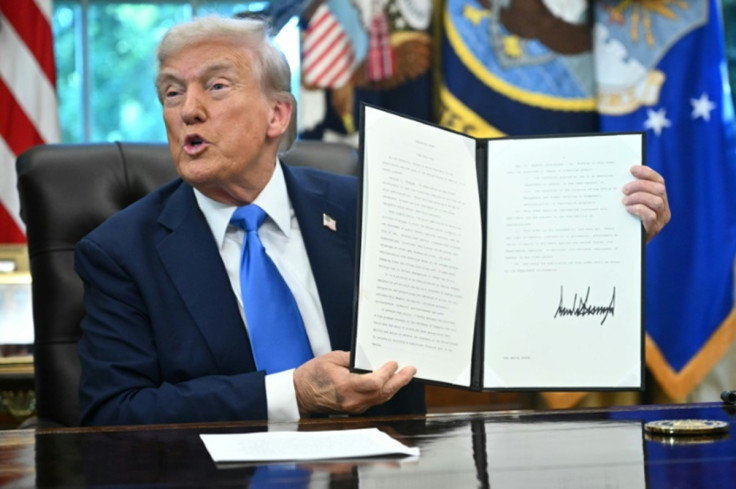
In a historic 51–47 vote, the US Senate has moved to revoke President Donald Trump's emergency trade powers, challenging the sweeping authority he used to impose tariffs on imports from more than 100 countries.
The vote marks a rare moment of bipartisan defiance, reflecting growing unease in Congress over the long-term economic and diplomatic fallout from Trump's trade policies.
The rare bipartisan rebuke reflects frustration in Congress over Trump's aggressive trade policies, which many lawmakers say have hurt American consumers and strained key alliances.
Senate Move Challenges Trump's Trade Authority
The resolution, introduced by Democratic Senators and backed by four Republicans, seeks to terminate the national emergency declaration that Trump invoked under the International Emergency Economic Powers Act (IEEPA) to justify his sweeping tariffs.
According to the Associated Press, the measure would effectively roll back the legal authority that Trump used to impose levies on steel, aluminium, and other imported goods without congressional approval.
Although the resolution faces long odds in the House of Representatives — now under Republican control — and is expected to be vetoed if it reaches the president's desk, it sends a strong political message that Congress wants to reclaim its constitutional role in shaping U.S. trade policy.
Senator Ron Wyden (D-Ore.), who chairs the Senate Finance Committee, said that 'American families are being squeezed by prices going up and up and up,' warning that rural states were among those hardest hit by Trump's tariffs, according to Associated Press.
Rare Bipartisan Support Signals Growing Divide
Four Republican senators--Susan Collins of Maine, Mitch McConnell of Kentucky, Rand Paul of Kentucky, and Lisa Murkowski of Alaska--broke ranks with their party to vote in favour of the resolution, according to The Guardian.
Collins said the tariffs were damaging Maine's cross-border trade with Canada, its largest trading partner.
'The Maine economy is integrated with Canada, our most important trading partner,' she said, urging that trade policy must 'reflect cooperation, not confrontation,' The Economic Times reported.
McConnell's decision to support the resolution was especially notable, highlighting discomfort even among Republican leadership over Trump's expansive use of emergency powers to shape trade policy.
Courts Have Also Questioned Tariff Powers
Trump initially justified his tariff policy by declaring a national economic emergency, claiming that the US trade deficit and reliance on foreign manufacturing posed threats to national security, according to a report by China Daily Asia.
But a federal appeals court ruling in August 2025 concluded that Trump had exceeded his authority under IEEPA.
The court said it was 'unlikely that Congress intended the President to have unlimited tariff authority,' setting an important legal precedent that Congress has now echoed legislatively. according to Associated Press.
Earlier this year, bipartisan lawmakers introduced legislation that would require congressional approval within 60 days of any new presidential tariff declaration, ensuring greater accountability.
Economic and Human Toll of Tariffs
Economists argue that the tariffs have served as a tax on consumers and businesses. The Tax Foundation estimated that this increase in household expenses would exceed $1,600 annually and could reduce US GDP by 0.5 per cent over the next decade.
The US government has collected nearly $88 billion in tariff revenue since Trump's measures took effect, according to China Daily.
For many Americans, these numbers translate into real hardship. Nebraska soybean farmer Mary Jensen told the AP that the uncertainty caused by shifting trade rules made it hard to plan.
'You plant your crop in the spring, you don't plant it on promises that change in a weekend,' she told AP News.
In Maine, loggers and paper mill workers are equally anxious about tariffs on Canadian lumber and pulp.
Collins said many fear layoffs and economic instability if the measures remain in place, according to The Economic Times.
Symbolic Vote, But a Strong Signal
While the House is expected to block the measure and Trump can veto any related legislation, Thursday's Senate vote is symbolically significant.
It demonstrates bipartisan unease with unilateral trade decisions and signals a congressional effort to reassert checks on presidential authority.
As a Le Monde analysis noted, the broader issue is constitutional: 'Allowing the president unchecked tariff power would amount to an improper abdication of legislative responsibility.'
The 51–47 Senate vote may not immediately change US trade law, but it sets a precedent for renewed congressional oversight and highlights a political shift — away from protectionist policy and toward rebalancing the power between the executive and legislative branches.
For millions of American workers, farmers, and consumers, it also represents a flicker of hope that trade policy will once again be crafted through debate, compromise, and accountability rather than executive decree.







